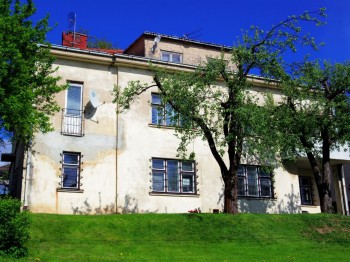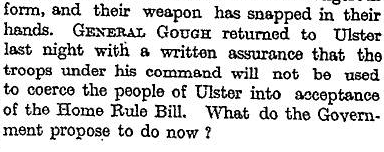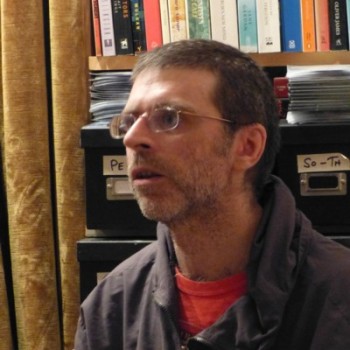We are developing the social individualist meta-context for the future. From the very serious to the extremely frivolous... lets see what is on the mind of the Samizdata people.
Samizdata, derived from Samizdat /n. - a system of clandestine publication of banned literature in the USSR [Russ.,= self-publishing house]
|

I visited the above house in Kaunas, Lithuania last month. In 1940, this house was the Japanese consulate. Kaunas functioned as the capital city of Lithuania prior to the Second World War. The Lithuanians considered Vilnius to be their rightful capital, but it was masquerading as the Polish city of Wilno at the time. Upon the German occupation of Western Poland and the Soviet occupation of Eastern Poland in late 1939, many (both Polish and Lithuanian) Jews were trapped in Lithuania and clearly in great danger, but were unable to gain exit visas to leave the Soviet Union (or travel across it by the Trans-Siberian railway) unless they had visas to go somewhere else. There were Japanese government rules stating that transit visas could be issued to Japan, but only if the applicant had plans to go somewhere else after Japan, and also that he had adequate financial resources.
Seeing the desperation of the situation, and against orders, Japanese consul Chiune Sugihara issued Japanese transit visas to anyone who asked. (In the book Bloodlands historian Timothy Snyder – who clearly finds Sugihara as fascinating a figure as I do – makes it clear that Sugihara was a Japanese spy as well as a Japanese consul, and his job was to keep track of Soviet troop movements for the Japanese government). During September 1940 he spent something like 20 hours a day writing out visas. When the consulate was closed and he had to leave, he was followed by a crowd to the railway station. As his train left, he was still throwing blank visas with his seal and signature on them to a crowd of desperate people. In total, he wrote something like 3000 visas, and as dependent family members could travel on the same visa as the principal person it was written for, those visas covered several times that number of people.
 Kaunas railway station today. Kaunas railway station today.
Upon receiving these visas, Jews were able to travel on the Trans-Siberian railway to Vladivostok and then go by ship to Japan. They then dispersed to various places, but many were deported to Shanghai when the tripartite pact with Germany was signed shortly afterwards. Shanghai was also under Japanese occupation, and there these people spent time in the Shanghai ghetto – Restricted Sector for Stateless Refugees – where they stayed until Shanghai was liberated by the Americans in 1945. I visited the remnants of the Shanghai ghetto in 2006, and wrote about it at the time. Although this was crowded and at times squalid, it was a place of relative safety. The Japanese behaved monstrously towards certain other groups, but they had nothing against Jews, and did not turn the Jews in Shanghai over to the Germans despite German requests. Rather cleverly, Jewish leaders in Shanghai played upon Japanese mistrust of their German allies. Upon being asked by a Japanese governor why the Germans hated the Jews so much, rabbi Shimon Sholom Kalish replied “They hate us because we are short and dark haired”.
Most Jews who got to Shanghai survived, and then emigrated to Israel, Australia, the US and other places after 1945. Estimates of the number of lives saved by Sugihara go as high as 10,000, although estimates of about 6,000 seem more common.
Half of the building in Kaunas is now a museum to Sugihara. I wanted to see this – it was why I went to Kaunas. The other people in the museum when I went there were a busload of Japanese tourists. Almost everyone who had signed the guest book had done so in Japanese, too. I didn’t see any Lithuanians or many other Europeans, which is a shame given this extraordinary story.

It’s an exceptionally good thing that the museum is there, but I did find the tone of the museum to be slightly curious. The museum did seem to be going out of its way to present the Japanese in general in the best possible light overall, rather than simply telling the story of Sugihara. That Sugihara was acting against orders was mentioned but not emphasised, and much was made of Jews who reached Japan being treated well, but not much was said about where they went after the Japanese alliance with Germany intensified and they were deported from Japan. The truth – the Shanghai ghetto mentioned above – doesn’t actually reflect too badly on the Japanese, but it is rather unfortunately connected to other things that do reflect badly on the Japanese. It is impossible to praise Sugihara himself too much – the man saved the lives of 6,000 or more people just out of basic human decency – but does this reflect well on Japan as a whole? That is harder to say. As is the case with other various people who did similar things, his story remained obscure for many years. His career with the Japanese foreign service ended after the war for reasons that may or may not have had to do with disobeying orders in Lithuania.

Eventually, Sugihara’s story became widely known, and he was later honoured by Yad Vashem, the state of Israel, the state of Japan and the state of Lithuania, but this took a long time. As it did with Paul Grüninger, Oskar Schindler, and others.
Forces of an offshoot of Al-Qaeda advance on Baghdad
“Blame Bush!” “Blame Blair!”
Can anyone explain to me why the starting point for anything newsworthy that Muslims do is eternally set at 2003?
Why not September 11th 2001 – one might have thought that was the big day this century for violent beginnings connected with Islam? Or why not date it from 1988, with the formation of Al-Qaeda? Or from the year 622, first year of the Hijra – if you take a long view of history, as ISIS themselves undoubtedly do? Or why not start the count later? How about late 2011 when President Obama took the last American troops out of what he called a “a sovereign, stable and self-reliant Iraq” just “in time for the holidays”?
Not that it is likely, as Muslim Iraqi fights Muslim Iraqi in a land from which the infidel was so delighted to absent himself, that comabatants on either side think much about American presidents at all.
Ten years ago today I tried my hand at alternate history with a post whose title was taken from the words General Eisenhower prepared for use in the event that the Longest Day had ended in defeat: “Our landings in the Cherbourg-Havre area have failed to gain a satisfactory foothold.”.
Here is an earlier effort in the same genre – a German newsreel made, I would guess in late June 1944. It mentions stiff fighting around Caen, but since Caen did not fall to the Allies until late July, that does not narrow the date down much.
The claim made at 2:07 that infantry assault troops were “airlifted in for the first night of the engagements” is false. The Allies owned the skies. Nor do I believe that the “German wartime fleet” ever gave the “signal for resistance” (as claimed at 2:46), or any other signal at that time and place.
It would have been a remarkable stroke of journalistic good fortune to have happened to be filming when the first news of the invasion came and to have captured the moment when soldiers grabbed their rifles, so I guess what we saw one minute in was a drill. The numerous shots of explosions and guns firing could have been filmed at any time during the war, although they may show real combat. Film of men looking through binoculars and speaking into microphones in a resolute manner is best obtained on days when little else is being done.
Since reality did not grant German soldiers an opportunity to stroll around abandoned Allied landing-craft on the beaches of Normandy, I think the shots shown at 5:16 (just after the picture at 5:13 of an SS soldier who looks oddly like Barack Obama) must be of the aftermath of the Dieppe Raid of August 1942. Given the great losses the Canadians suffered that day I initially thought the film at 8:25 of Canadian prisoners from the North Nova Scotia Highlanders was also taken after that operation, but Wikipedia makes no particular mention of soldiers from Nova Scotia taking part in the Dieppe Raid, whereas the North Nova Scotia Highlanders are listed as having taken part in the Canadian D-Day landing at Juno Beach. I now think that last part of the film is mostly true.
The panning shot at 3:16 of the invasion fleet itself – impossible not to admire the steady nerves of the German cameraman who took that – looks as if it really does depict that vast armada coming “straight for me”, as Major Pluskat famously told his superiors, and I cannot see how the pictures of downed gliders could show anything but the real price paid by the D-Day vanguard.
I see no particular reason other than the general mendacity of the Nazis to disbelieve the section showing the fighting around Caen. There was plenty of time for film really taken then to have reached Berlin and be made into a newsreel. The announcement at 7:09 that the men shown surrendering “are all surprised that the invasion is over so quickly” turned out to contain a wrong assumption, but one that might have been believed at the time.
Many Samizdata readers know much more than I about military history – including the Samizdata reader to whom I am married – and I expect some of them will make better informed judgements than mine as to the actual origin of some of the scenes in the newsreel. Let us be glad that we can look back at these images with the tranquility of the historian in a society that, unlike the Nazis, still cares, if diminishingly, for objective truth.
For a view of D-Day from the German side that strove a little harder to be honest, see Von Rundstedt’s report for distribution to commanders.
And remember those Allied soldiers, sailors and airmen who died. Their comrades who survived are mostly entering their nineties now and vanishingly few will live to assemble on the beaches for any big anniversary after this.
Via the Twitter page of Dominique Lazanski, I recently found my way to a fascinating but depressing piece about Russian internet policy, by “Russia’s First Blogger”, Anton Nossik:
As for Putin’s solemn oath to protect the Russian Internet from any undue and arbitrary attempts at government regulation, well, he honored it for the next 13 years. As keen as Putin was to control the federal nationwide TV channels, he seemed absolutely uninterested in regulating the Internet, be it the content, the cables, or the e-commerce. Any attempts by overzealous Russian lawmakers, ministers or law enforcement (the infamous siloviki, or strongmen) to regulate the Net were routinely aborted by Putin’s administration. Anyone who proposed such legislation to please the Kremlin soon found out that the Kremlin was very far from pleased. Internet regulation bills sponsored by everyone from Moscow mayor Yuri Luzhkov, to government ordinance drafts by ministers, and dozens of other proposals to regulate the Net had been quickly buried and forgotten for lack of presidential support between 2000 and 2012.
As a result, the Internet developed into Russia’s only competitive industry. Companies like Yandex and VKontakte easily outperformed international competition (Google and Facebook, respectively) in Russian-speaking markets. These Russian start-ups did not copy successful American models, but rather the other way round: Almost every Yandex service (maps, payments, webmail, contextual advertising, etc.) was launched several years ahead of its Google-based analog. The VKontakte social network has many services and features that Facebook badly lacks, such as social music and video hosting and an advertising exchange, allowing any popular page or group to monetize its traffic almost automatically.
The Internet also became Russia’s only territory of unlimited free speech. Opposition figures, banned elsewhere in mass media, found easy access to their audiences by going online. Moreover, privately owned online media sources, such as Lenta.Ru, Gazeta.Ru, NewsRu.com and RBC News, used to outperform traditional mass media outlets in terms of audience and pageviews. Alexey Navalny, Russia’s most prominent independent politician and Kremlin-basher, found millions of followers all over the country, despite being banned from all nationwide TV channels and radio stations for almost half a decade.
But then, President Putin decided to shut it all down. What had happened?
We should blame the 2011-2012 Moscow protests for Putin’s unexpected and instant conversion into a paranoid Internet-hater.
He blamed the messenger for the message, in other words.
He made his change of mind public during a speech on April 24. Putin shocked the entire world with his epiphany that the Internet was initially created as a special CIA project, and is still run as such. Putin went on to claim that Yandex, Russia’s biggest and most successful Internet startup – ranked fourth in the world by number of search requests, valued at about $15 billion on NASDAQ in mid-February 2014, earning more revenues and profits in 2013 than any other media company in Russia—is also controlled by foreign intelligence seeking to harm Russia’s interests. Those remarks instantly brought Yandex shares down 5.5 percent. As of this writing, the company is now worth $9.19 billion, nearly $6 billion off its mid-February mark.
And so on. The golden days of the Russian internet would appear to be over:
Under the new laws, any social media platform that wishes to serve a Russian audience will be obliged to retain all user data for at least six months and to surrender this information to Russian security services upon request, without a court ruling or any other form of justification or explanation. Moreover, any foreign social media platform serving Russian users has to physically keep all sensible user data within the boundaries of the Russian Federation. And we’re not talking Russian user data, but rather all personal information of any user who happens to have some readers from Russia – like, say, Barack Obama, who has no less than 3,000 Russian nationals among the 40.5 million subscribers to his Facebook page. Twitter should also prepare to move all of Obama’s personal data to Russia and hand it over to the FSB, since both Putin and Medvedev are his followers on Twitter. Ditto for Google. If any of these companies don’t comply they would be subject to administrative fines, up to 500,000 roubles ($14,000), and Russian ISPs would have to block access to these platforms.
This Orwellian masterpiece of legislation was signed into law by Vladimir Putin on May 5, 2014, and it will be enforced from August 1, 2014. Will that be the last day of Russian Internet? Maybe. Unless a new law kills it even faster.
As you can see, picking out the highlights of this piece was a task that was basically beyond me. This really is one of those Read The Whole Thing things. I am in no position to second guess Anton Nossik, but given that the excellent Dominique Lazanski linked to it, I assume the story he tells to be at the very least roughly right. And if it is roughly right, doesn’t it remind you of another similar tale that unfolded in Russia just under a hundred years ago? From dire economic necessity, Lenin had presided over a similar period of economic liberty and creativity, known as the New Economic Policy. And then he shut that down.
But Lenin shut down his NEP because he never believed in it. He only let it happen in the first place because people were starving and the Soviet State wasn’t yet able to suppress the resulting popular complaints. As soon as Lenin and his new apparatus of tyranny got strong enough to do this, bye bye NEP.
But what is Putin thinking? My first guess at a guess would be that he thinks that shutting down the Russian internet is of no more consequence than had been his initial impulse to leave it alone. Letting a thousand internet flowers bloom didn’t mean anything. And nor does him zapping all the flowers with legislative weedkiller. That’s his attitude.
But what do I know? Not much, but I will soon know rather more about such stories as this one, because Dominique Lazanski will be speaking at my home this coming Friday, on the subject of “The Future and Its Digital Enemies”:
I will talk about International Internet policy issues otherwise known as Internet Governance and how individuals, groups and governments play key roles in this process. Ultimately, it is the work of governments that is the real threat, but many play interesting roles in the political chess game. However, all is not lost, innovation and the market process are helping to undermine these threats.
Whenever that word “governance” is heard, you just know that something very bad is being attempted, so it is good to know that the Governancers are not having it all their own way in these matters.
About a month ago, I was at the Institute of Economic Affairs to hear a talk given by Antoine Clarke to the End of the World Club. The audience was larger than usual, and of a very high quality. It listened, fascinated and engrossed, and with some rueful laughter at the intense relevance of a seemingly rather obscure slice of history to our own times.
The talk was about French investment, private but egged on by French politicians for their own foreign policy reasons, in pre-revolutionary Russia. This investment was huge, and for a while it provided a healthy income to French savers, by French standards. But then, because of events which the French media of the time somehow neglected to inform their readers about, it all started to go wrong, and wronger and wronger, and then of course very wrong indeed. Collusion and corruption on a huge scale among and between politicians, bankers and journalists is not, said Antoine, anything new.
Antoine has now gathered his spoken thoughts from that night into a blog posting at the Cobden Centre.
Quote:
The first Russian bonds sold in France were in 1867 to finance a railroad. Others followed, notably in 1888. At this point the French government decided on a policy of alliance with Russia and the encouragement of French savers to invest in Russian infrastructure. From 1887 to 1913, 3.5% of the French Gross National Product is invested in Russia alone. This amounted to a quarter of all foreign investment by French private citizens. That’s a savings ratio (14% in external investment alone) we wouldn’t mind seeing in the UK today!
A massive media campaign promoting Russia as a future economic giant (a bit like China in recent years) was pushed by politicians. Meanwhile French banks found they could make enormous amounts of commission from Russian bonds: in this period, the Credit Lyonnais makes 30% of its profits from its commission for selling the bonds.
In 1897, the ruble is linked to gold. The French government guarantees its citizens against any default. The Paris Stock Exchange takes listings for, among others: Banque russo-asiatique, la Banque de commerce de Sibérie, les usines Stoll, les Wagons de Petrograd.
The first signs of trouble come in 1905, with the post-Russo-Japanese War revolution. A provisional government announced a default of foreign bonds, but this isn’t reported in the French mainstream media or the French banks that continue to sell (mis-sell?).
During the First World War, the French government issued zero interest bonds to cover the Russian government’s loan repayment, with an agreement to sort out the problem after the war. However, in December 1917, Lenin announced the repudiation of Tsarist debts.
Boom, bust. And surprise surprise, French governments of the twentieth century were neither willing nor able to provide anything like the kind of compensation for disappointed French savers that had earlier been promised.
Antoine Clarke is fluently English thanks to his English father and fluently French thanks to his French mother, and he has lived and worked in both countries. As long as I have known him I have urged him to make maximum use of this bilingualism, in connecting us Anglo libertarians to French stories and writings, and vice versa. This talk and his subsequent written version of it is a perfect example of the sort of thing I had in mind, and I thank and congratulate him for it. How many non-French libertarians already knew this story? Some, certainly, a bit, but certainly not me.
… Wrongly, for Castro is no Louis le bien aimé. The French royal personage whose mode of life was closest to that of Comrade Fidel before senility overtook him was Marie Antoinette, who played at being a milkmaid and a shepherdess in the Queen’s Hamlet built for her in the gardens of Le Petit Trianon. As the Queen found refuge from the demands of court life by milking cows into buckets of Sèvres porcelain in the company of her dear friend and confidante the Princesse de Lamballe, so the First Secretary
“enjoyed a private island, Cayo Piedra, south of the Bay of Pigs, scene of the failed CIA-sponsored invasion of 1961 . . . a “garden of Eden” where he entertained selected guests including the writer Gabríel Garcia Márquez, and enjoyed spear-fishing.”
Sharing that simple pleasure, they talked about books and the nature of absolute power.
The centenary of the Curragh Incident (or Curragh Mutiny as it sometimes known) took place a couple of months ago. I had been expecting to see a fair amount of comment on what was a fairly dramatic event but so far not a dicky bird. That is not to say that there hasn’t been any comment, just that I haven’t seen it. Assuming there hasn’t been any, perhaps, belatedly, it is about time I got the ball rolling.
Since 1910 the British Government had been attempting to grant devolution, or Home Rule as it was then known, to Ireland. Ulster and the Conservative Party (or Unionists as they were then known) objected. Some 500,000 of Ulster’s British population signed a covenant stating that they would resist it. When this failed to impress the government the Ulstermen established their own army, the Ulster Volunteer Force – not to be confused with more modern creations bearing the same name – and even set up a provisional government, just in case.
The government, at first thought the Ulstermen were bluffing. But by early 1914 they had realised they weren’t and that they were going to have to call in the military. Winston Churchill, First Lord of the Admiralty sailed a cruiser into Belfast Lough. At the same time orders were issued to the British garrison at the Curragh in Southern Ireland at which point the officers resigned their commissions, or to put it another way, walked out. This, incidentally, was something they were perfectly entitled to do.
The government backed down while denying that they had done any such thing. The officers returned to their posts but the Secretary of State for War did not. One assumes that this meant the end of government plans to “coerce” Ulster but seeing as the First World War broke out at the precise moment things were coming to a head, we shall never know.  The Times 14 March 1914, p9 My guess is that the mutineers were right. Indeed I suspect that had their successors taken a similar stance in 1969 we would have saved ourselves a whole lot of trouble. But that’s another story.
To commemorate VE Day, here is some appropriately tasteful and historically accurate humour from Mitchell and Webb: A New Führer.
At one time Lara Pawson, inspired by the works of Basil Davidson and other British Marxists, lionized Angola’s MPLA as a “radical socialist movement that epitomised the heroism of African liberation”. I received the impression that her faith in radical socialism is diminished but not extinguished. Her faith in the MPLA is quite gone. She writes,“Angola’s brutal history, and the MPLA’s role in it, is a truth that we must tell”:
When I arrived in Luanda, the MPLA had long been – and still is – a member of the Socialist International, an organisation that claims to pursue “progressive politics for a fairer world”. I remember my pleasure on hearing politicians and other members of the urban elite calling each other camarada (comrade). Even the party rhetoric sounded remarkably similar to that of the revolutionary years of the 1970s. But a few months into my new job, when the country’s “fourth war” finally erupted, I could no longer hide from the blindingly obvious: if revolutionary politicians were what I was after, I was at least 20 years too late.
In fact, this was also wrong. I began to discover that the idea of a 1970s MPLA heyday was just as misguided. An Angolan colleague told me about 27 May 1977, the day an MPLA faction rose up against the leadership, and the honeymoon of revolution crashed to a halt. Some called it an attempted coup, but my colleague insisted it was a demonstration that was met with a brutal overreaction.
Whichever story you believe, six senior members of the MPLA were killed that day by supporters of the uprising. In response, President Neto, the politburo and the state media made many highly inflammatory statements that incited extraordinary revenge. In the weeks and months that followed, thousands of people – possibly tens of thousands – were killed. Some of the executions were overseen by Cuban troops sent to Angola by Fidel Castro to repel a South African invasion.
…
But what rattled me was that Angola-watchers on the left – intellectuals whom I admired – all seemed to have turned a blind eye to the thousands of killings. It was as if their commitment to the party was so deep that, in the end, they heard only the voices of its leaders and fell deaf to the calls from below.
That white conservatives also had their moment of disillusion regarding an Angolan liberation movement, when Jonas Savimbi of UNITA allegedly had Tito Chingunji and Wilson dos Santos executed – or when whatever really happened with that bloody business happened – is somewhat better known. The MPLA has escaped similar scrutiny, for the usual reason.
It is the First of May, a date traditionally associated with Marxism. Let us therefore pause today to remember that at least 100 million people were killed by Marxist governments in the 20th century, a number that dwarfs the predations of every other organized movement in human history.
Richard Carey is a devoted student of the English Seventeenth Century and of its ideological struggles in and around the time of the Civil War. Tonight, he will be giving a talk about all this at the Rose and Crown in Southwark, and I will definitely be there.
There could hardly be a more important subject for an English libertarian. Libertarianism now has a rather American flavour. The biggest libertarian books, especially those of more recent vintage, tend to be written by Americans or at least in America. So, if it is the case (and it is) that libertarianism of the modern and self-consciously ideological sort actually has its origins in the English Seventeenth Century, then that is a fact that we English libertarians should regularly be celebrating and reflecting upon.
My own off-the-top-of-my-head take on this is that libertarianism of the sort I espouse most definitely did make its first big appearance in Seventeenth Century England, in the form of the Levellers. But the impeccably libertarian nature of this first great libertarian ideological eruption has been masked by the kinds of questions that most exercised those first English libertarians. Libertarianism now tends to be about what governments ought to do, and most especially about the many things that governments now do, but ought not to do, or at the very least to do much less. In the seventeenth century, libertarians with unswervingly libertarian views on, e.g., property rights as the correct institutional foundation of liberty, were not quite so exercised about how the government should behave, although they did have plenty to say about this. Their central concern was: Who has the right to be the government in the first place? If you do have to have some kind of government, who should choose it? The central preoccupation of those Levellers was: Where does political authority come from? If there must be government, who decides about who shall be that government?
Charles I – famously or infamously according to taste – claimed that God had chosen the government of England, in the form of … Charles I. This the Levellers, of course, challenged. But having challenged it, and the king having been executed, the question remained: If Charles I is not the legitimate ruler of England, then who is?
The Levellers were “egalitarian” in the sense that they were indeed far more egalitarian about who should be allowed to participate in that political debate, about who should govern. Political authority sprang from … everyone! When it came to deciding who the government was, everyone’s voice counted. This was the sense in which the Levellers really were, sort of, “levellers”.
But this political egalitarianism was seized upon by Seventeenth Century Royalists as evidence that the Levellers were also egalitarians in the modern sense, who believed that economic outcomes should be equalised by the government. They were accused of being socialists. There were indeed real socialists around at that time. These were the Diggers. But the Levellers had very different views to the Diggers.
Later, the Levellers were proclaimed to be socialists by another ideological tendency, namely … socialists.
The irony being that these later socialists mostly had ideas about how government should conduct itself were pretty much identical to those of Charles I. Charles I believed that the state (i.e. Charles I) had relentlessly to intervene in the market and in the workings of the wider society, in order to correct freedom’s economic and other injustices, and never mind any harmful consequences that flowed from such intervention, or “tyranny” as the Levellers called such activities. Modern socialists believe exactly the same, about themselves.
So, the Levellers, historically, have been caught in a pincer movement of lies, proclaimed by two different brands of statists. Royalist statists accused the Levellers of being socialists. Subsequent socialists claimed the Levellers as socialists. Both were wrong. But if we libertarians do not now correct these errors, nobody will.
I still recall with great pleasure the talk that Richard gave at my home last year about the ideological context within which the Levellers first arose, and the questions that they were most keen to answer. Tonight, I am hoping to learn more about the answers they gave to these questions, and, in general, about the nature of their libertarianism. Because libertarianism is most definitely what it was.
I wrote this posting in some haste, to be sure that what I wrote got posted in time to encourage at least some who otherwise might not have done to attend Richard Carey’s talk this evening. I am fully aware that the above is a highly schematic and simplified version of a very complicated story. I have, in particular, supplied no linkage to pertinent historical writings. Comments and corrections, especially with links to pertinent material, will be very welcome to me, and I’m sure to others also.
LATER: I see that in his piece about Richard (linked to above), Simon Gibbs includes yet again an earlier picture taken by me, of Richard sporting lots of hair like a down market Cavalier. Now he looks more like this:

Technically, that is not a good photo, but it’s the best I can do right now.
Hair matters a lot, when it comes to Seventeenth Century English ideological disputes.
I learned about white male Princeton freshman Tal Fortgang and the unearned privilege that got him where he is via Instapundit.
I decided to take their advice. I actually went and checked the origins of my privileged existence, to empathize with those whose underdog stories I can’t possibly comprehend. I have unearthed some examples of the privilege with which my family was blessed, and now I think I better understand those who assure me that skin color allowed my family and I to flourish today.
Perhaps it’s the privilege my grandfather and his brother had to flee their home as teenagers when the Nazis invaded Poland, leaving their mother and five younger siblings behind, running and running until they reached a Displaced Persons camp in Siberia, where they would do years of hard labor in the bitter cold until World War II ended. Maybe it was the privilege my grandfather had of taking on the local Rabbi’s work in that DP camp, telling him that the spiritual leader shouldn’t do hard work, but should save his energy to pass Jewish tradition along to those who might survive. Perhaps it was the privilege my great-grandmother and those five great-aunts and uncles I never knew had of being shot into an open grave outside their hometown. Maybe that’s my privilege.
Or maybe it’s the privilege my grandmother had of spending weeks upon weeks on a death march through Polish forests in subzero temperatures, one of just a handful to survive, only to be put in Bergen-Belsen concentration camp where she would have died but for the Allied forces who liberated her and helped her regain her health when her weight dwindled to barely 80 pounds.
Read the whole thing. The fact that those telling him to “check his privilege” were wrong in their assumptions is only the beginning of his argument.
|
Who Are We? The Samizdata people are a bunch of sinister and heavily armed globalist illuminati who seek to infect the entire world with the values of personal liberty and several property. Amongst our many crimes is a sense of humour and the intermittent use of British spelling.
We are also a varied group made up of social individualists, classical liberals, whigs, libertarians, extropians, futurists, ‘Porcupines’, Karl Popper fetishists, recovering neo-conservatives, crazed Ayn Rand worshipers, over-caffeinated Virginia Postrel devotees, witty Frédéric Bastiat wannabes, cypherpunks, minarchists, kritarchists and wild-eyed anarcho-capitalists from Britain, North America, Australia and Europe.
|









